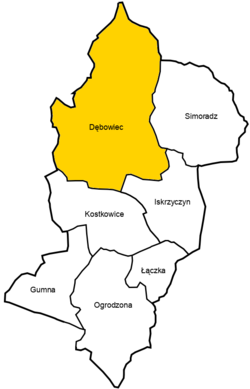Dębowiec, Cieszyn County
| Dębowiec | ||
|---|---|---|
| Village | ||
 |
||
|
||
 Location of Dębowiec within Gmina Dębowiec |
||
| Location of Dębowiec within Gmina Dębowiec | ||
| Coordinates: 49°48′48.72″N 18°43′12.40″E / 49.8135333°N 18.7201111°E | ||
| Country | Poland | |
| Voivodeship | Silesian | |
| County | Cieszyn | |
| Gmina | Dębowiec | |
| First mentioned | ca. 1305 | |
| Area | 13.17 km2 (5.08 sq mi) | |
| Population (2007) | 1,772 | |
| • Density | 130/km2 (350/sq mi) | |
| Time zone | CET (UTC+1) | |
| • Summer (DST) | CEST (UTC+2) | |
| Postal code | 43-426 | |
| Car plates | SCI | |
Dębowiec [ˈdɛ̃bɔviɛts] (German: Baumgarten, Czech: Dubovec) is a village and the seat of Gmina Dębowiec, Cieszyn County in Silesian Voivodeship, southern Poland. It has an area of 13.17 square kilometres (5.08 sq mi) and a population of 1,772 (2007). It lies in the historical region of Cieszyn Silesia.
Both Polish and German names are of topographic origins, but with a slightly different meanings. The Polish name is derived from oaks (Polish: dąb, plural dęby) and denotes an oaken part of wood. German name: Baumgarten is a conjunction of two words: (tree) and (garden).
The village was first mentioned in a Latin document of Diocese of Wrocław called Liber fundationis episcopatus Vratislaviensis from around 1305 as item in Dambonczal. It meant that the village was in the process of location (the size of land to pay a tithe from was not yet precise). The creation of the village was a part of a larger settlement campaign taking place in the late 13th century on the territory of what would later be known as Upper Silesia.
The village became a seat of a Catholic parish, first mentioned in an incomplete register of Peter's Pence payment from 1335 as Bemgard and as such being one of the oldest in the region. It was again mentioned in the register of Peter's Pence payment from 1447 among the 50 parishes of Teschen deanery as Bomgarte.
The name from 1335 is of Germanic roots and indicates that among long ethnically Polish (Slavic, as the name from Liber fundationis.. is of Slavic origins) citizens an unknown number of German settlers arrived and gave the common village a German name which eventually evolved into Baumgarten.
...
Wikipedia


